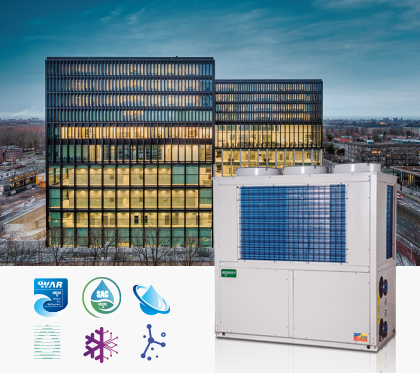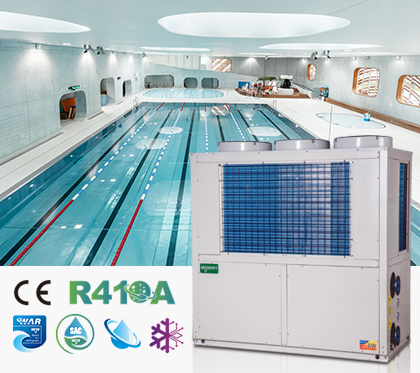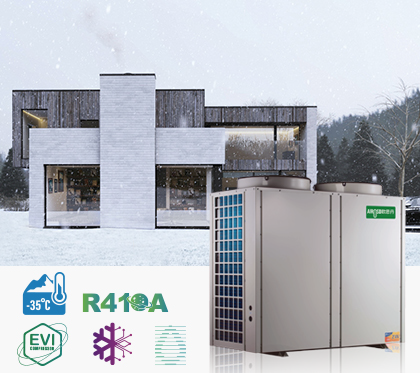Are Heat Pumps Noisy? This question is a significant consideration for homeowners exploring energy-efficient temperature control solutions. Heat pumps, lauded for their efficiency and eco-friendliness, have become increasingly popular. However, potential noise production is an important factor to weigh when deciding to install a heat pump. In this article, we will delve into the various aspects that influence the noise levels of heat pumps, compare different types, and explore solutions for noise reduction to ensure your comfort and satisfaction with these systems.
Types of Heat Pumps
There are several types of heat pumps in the market, including air source, ground source, and hybrid heat pumps. Every heat pumps have its unique. Air source heat pumps are the most common type and are designed to extract heat from the air outside your home. Ground source heat pumps, also known as geothermal heat pumps, are designed to extract heat from the ground. Hybrid heat pumps combine the features of air-source and ground-source heat pumps, using both outside air and geothermal heat to provide heating and cooling.

Hot Water Heating Pump Factory
Deciphering Heat Pump Noise: Factors and Considerations
When it comes to understanding the noise associated with heat pumps, several critical factors come into play. The type of heat pump, its location, installation quality, and ongoing maintenance all contribute to the operational sound level. Air source heat pumps, while common, have a reputation for being louder due to their fan-based operation, with noise levels that can vary significantly. On the other hand, ground source heat pumps operate with less noise, offering a quieter alternative. Hybrid systems blend these technologies and their noise profiles. We'll break down these factors and provide insight into how you can achieve a quieter heat pump experience.
Evaluating Heat Pump Sound Levels
The question of noise levels in heat pumps is not one with a uniform answer; it is multifaceted, dependent on the specific type of heat pump, its installation site, and the thoroughness of its maintenance routine. This nuanced approach helps to understand the potential for noise and how it can be mitigated.
Air Source Heat Pumps
Air source heat pumps are typically the noisiest type of heat pump because they use fans to move the air over the refrigerant coils. The noise level of an air source heat pump can range from 35 decibels (about the same as a quiet library) to 75 decibels (about the same as a vacuum cleaner) depending on the model and the speed of the fan. Newer air source heat pump types are meant to be quieter, with noise levels as low as 19 decibels.
Ground Source Heat Pumps
Ground-source heat pumps are generally quieter than air-source heat pumps because they do not use fans to move air over refrigerant coils. Instead, they circulate water through pipes buried in the ground to extract heat. A ground source heat pump's noise level is normally about 50 decibels, which is comparable to that of a refrigerator.
Hybrid Heat Pumps
Hybrid heat pumps are a combination of air-source and ground-source heat pumps, so the noise level will depend on which type of heat source is being used. When the heat pump is using air as the heat source, it will be noisier than when it is using the ground as the heat source.

China Commercial Swimming Pool Heat Pumps
Location and Installation
The location and installation of your heat pump can also have an impact on how noisy it is. If your heat pump is installed near a bedroom or living space, you may notice more noise than if it is installed in an outdoor location. Furthermore, the quality of the installation might have an effect on the noise level, as a badly placed heat pump may cause greater vibration and noise.
Maintenance
Proper maintenance is crucial to keep your heat pump running efficiently and quietly. Regular maintenance, including cleaning and replacing filters, lubricating moving parts, and inspecting the system for any issues, can help reduce noise levels. If you notice unusual or excessive noise coming from your heat pump, it may be a sign that it needs maintenance or repairs.
Noise Reduction Options
If you are concerned about the noise level of your heat pump, you have various alternatives. Some newer heat pump types are meant to be quieter, so if noise is an issue, consider investing in a newer model. Adding insulation around the heat pump can also help lower noise levels. Planting trees or erecting a fence around the heat pump can also aid in noise reduction.
Conclusion
While heat pumps are not inherently noisy appliances, the noise they produce is influenced by the model, installation environment, and maintenance practices. With the correct approach to selection, installation, and upkeep, heat pumps can provide a harmonious balance of energy efficiency and quiet operation, making them a valuable addition to any home. If noise concerns persist, consider the latest models designed for reduced sound emissions or implement noise-reduction strategies to enhance your heat pump's quietness.
By the way, we are offer a wide range of water heater heat pump including the pool heat pump, DC Inverter water heater heat pump,r32 heat pump water heater, and more. If you are looking for a heat pump for your home or your business, look no further than AIROSD!
FAQs
Q1: What is the average lifespan of a heat pump?
A1: The lifespan of a heat pump typically ranges from 10 to 15 years, although regular maintenance and proper use can extend this timeframe. Learn more about how to maximize the lifespan of your heat pump with our essential heat pump maintenance tips.
Q2: Can I reduce the noise from my existing heat pump?
A2: Yes, there are several ways to reduce noise from an existing heat pump, including servicing moving parts, installing noise-reducing barriers or enclosures, and ensuring the system is correctly balanced and installed. Check out our guide on heat pump noise reduction for detailed strategies.
Q3: How do I choose the right heat pump for my home?
A4: Choosing the right heat pump involves considering the size of your home, climate, and specific heating and cooling needs. For a comprehensive overview, refer to your ultimate heat pump installation guide, which provides step-by-step assistance.



